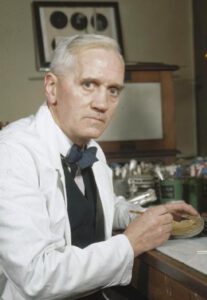Alexander Fleming
The Discoverer of Penicillin

Sir Alexander Fleming was born on August 6, 1881 on a farm in Lochfield (Community Darvel). From 1902 he studied at the ‘St. Mary’s Hospital Medical School ‘in Paddington and graduated in 1906. He remained at the institute and in 1921 became Deputy Director, in 1946 even its Director. In the early days of his Career, Fleming focused on Autovaccine Medications, used primarily in alternative medicine for the treatment of chronic infections, and made specifically for the individual patient.
Alexander Fleming became known through the discovery of Penicillin.
Before Fleming left for a Holiday in September 1928, he used a Staphylococcus Culture to examine it later, but a Mold was also put to the Test. On his return, he found that the Bacteria near the Fungus could not grow. He also studied this Effect with other bacterial Species but did not get the idea to use it as a Drug. This was to happen only years later (1938) by Howard W. Florey, Ernst B. Chain and Norman Heatley, who continued his Research. In 1945 they and Sir Alexander Fleming got -he was raised to the Nobility in 1944- this the Nobel Prize. In addition, Fleming was named honorary Doctor of twelve american and european Universities, Commander of the French Legion of Honor and honorary Director of the University of Edinburgh.
In addition to his Work as a Bacteriologist, Fleming also worked as a Freemason and was from 1925 several times ‘Master Chair’ of the Santa Maria Freemason Number 2692 and from 1936 the Misericordia Lodge No. 3286. In 1942 he became ‘First Grant Conductor’ of the United Grand Lodge of England and from 1948 their ‘Great Overseer’. He was also a Member of the London Scottish Rifles Lodge No. 2319 ‘and reached the 30th Degree of the’ Old and Adopted Scottish Rite ‘.
Sir Alexander Fleming died in March 1955 of a Heart Attack and was buried in St. Paul’s Cathedral.